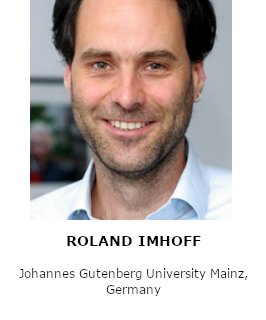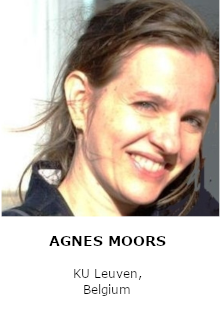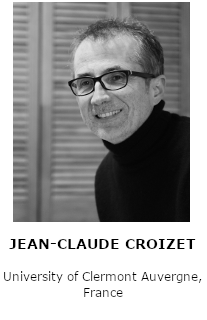
|
|
|
Keynote speakers
We are happy to welcome:
as ESCON2019 keynote speakers.
ROLAND IMHOFF - Johannes Gutenberg University Mainz, Germany Rethinking the effect of similarity on judgments and categorization It is a psychological truism that social perception and judgment is rarely made in isolation but in a rich context of – spatially and temporarily – proximal context stimuli. Classical theories from psychophysics and social cognition have long debated and empirically scrutinized under which conditions judgments assimilate to and when they contrast away from context stimuli. Two parts of the talk will address basic principles of target-standard similarity, and the role of similarity in social categorization. Results from experiments determining standard extremity a priori as well as more fine-grained curve-fitting studies in the domain of facial dimensions will revisit the widespread assumption of assimilation to moderate (i.e., relatively similar) and contrast away from extreme (i.e., relative dissimilar) comparison standards. In the last part of my talk, I will take the role of similarity to a more social domain of categorization. Specifically, I will contrast two potential relations between social categorization and the meta-contrast between alleged groups. The meta-contrast ratio quantifies the relation between similarities within a category compared to those between categories (much like an F fraction). In a given information ecology, dimensions on which there are seemingly distinct group with large meta-contrast ratios are used to infer relevant social categories in a bottom-up manner. At the same time, it has also been posited that perceivers (over-)accentuate such a meta-contrast as a function of top-down category labels. Data testing both directions will provide support for the former but not for the latter in the domain of complex, ecologically valid social categories. Together, these studies will highlight the ubiquitous relevance of the basic principle of similarity in everyday life.
AGNES MOORS - KU Leuven, Belgium Toward a goal-directed explanation of suboptimal behavior Dual process models of behavior causation distinguish between (a) a stimulus-driven process in which a stimulus activates the association between the representation of stimulus features and the representation of a response (S-R) and (b) a goal-directed process in which the value and expectancy of the outcomes of one or more behavior options are weighed before an action tendency is activated (S:R-O → R). I propose to embed the goal-directed process in an action-control cycle, in which discrepancies between goals and stimuli can be reduced via behavior (assimilation), a change of goals (accommodation), and reinterpretation of the stimuli (immunization). Dual process models vary in their view of the interplay between both processes: In the traditional, default-interventionist architecture, the stimulus-driven process is the default determinant of behavior, and taken to be responsible for producing suboptimal behavior, whereas goal-directed processes can occasionally intervene to produce more optimal behavior. I propose and alternative, parallel-competitive architecture in which the goal-directed process competes and wins from the stimulus-driven process and is therefore the default determinant of behavior (e.g., Moors, Boddez, & De Houwer, 2017). In the latter architecture, seemingly suboptimal behavior arises when goals driving the behavior are hidden and therefore overlooked. Truly suboptimal behavior stems from (a) sand in the wheels of the goal-directed cycle, or (b) stimulus-driven processes that escape competition from the goal-directed process. I illustrate ways in which several assumptions of the parallel-competitive model can be tested.
JEAN-CLAUDE CROIZET - University of Clermont Auvergne, France From stereotype threat to symbolic violence: Documenting social reproduction from social psychology The concepts of "situation" and "social context" lay at the core of social psychology. Yet these concepts are rarely defined per se. They more often act as postulates that affirm the "social" grounding of the kind of psychology we do; they constitute a marker that allows us to identify and recognize ourselves as social psychologists. In this presentation I will argue that one problem that our field faces—and a likely significant cause of our replication crisis—resides in the lack of elaboration of the "social" in our models. This, I believe, directly translates in a drop of both construct and internal validities and undermined statistical power. I will advocate for the necessity to reconnect with the "soft" social sciences to build stronger theories. To illustrate this point, I will take the example of the literature on stereotype threat and social group achievement gap, present and discuss several studies.
|




